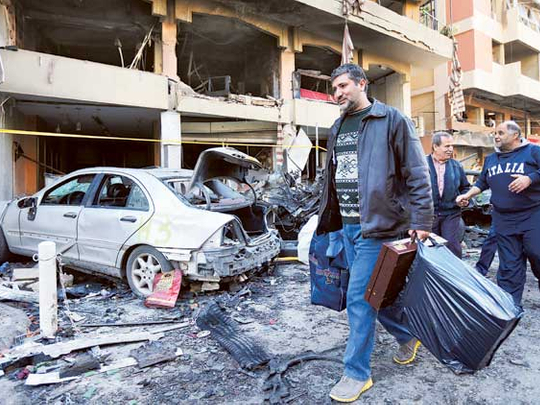
Beirut: Politically paralysed by deep divisions exacerbated by the war in neighbouring Syria, Lebanon is likely to see a continuing cycle of political violence, analysts say.
On Thursday, four people were killed in a bomb blast in a southern Beirut stronghold of the powerful Shiite Hezbollah movement, a key ally of Damascus, less than a week after the assassination of a prominent Sunni critic of the Syrian regime.
The attacks were the latest in a string of incidents linked to the Syrian conflict that have strained Lebanon’s fragile multi-sectarian political system.
“I expect an escalation of the deterioration in the security situation,” said Hilal Khashan, a professor of political science at the American University in Beirut (AUB).
“The explosions are a direct consequence of the situation in Syria and finding a solution to the crisis in Syria is facing a deadlock,” he said.
The effects have been far-reaching for Lebanon’s political scene, traditionally fractious but now increasingly dysfunctional.
The government effectively collapsed nine months ago, with the resignation of the prime minister, and lengthy negotiations on the formation of a consensus replacement have gone nowhere.
Parliamentary elections have been postponed, and there are doubts about whether a presidential vote scheduled for May will go ahead. At the root of the tensions lies a deep division between Hezbollah and the so-called March 14 coalition, established in the wake of the 2005 assassination of Sunni former prime minister Rafik Hariri.
The split has only widened with Hezbollah’s decision to fight alongside Syria’s President Bashar Al Assad against an uprising that is supported by many Lebanese Sunnis.
“There is a deep underlying split [that is] obvious in this country,” said Karim Makdisi, a professor of political studies at AUB.
“It comes in phases. The underlying issue remains, and then when there’s a particular regional issue, this stuff comes back up to the surface.”
Since the war in Syria began, Hezbollah has seen its southern Beirut stronghold targeted in three bomb attacks, along with a double suicide bombing that hit the Iranian embassy in Beirut.
The attacks illustrate a growing trend of Sunni radicalisation in Lebanon fuelled by the Syrian conflict and heightened sectarian rhetoric, said Sahar Atrash, an analyst at the International Crisis Group.
“The traditional leaders of the Islamists ... are losing in favour of those who are more radical,” she said.
“In the view of many they proved not to be strong enough to act against Hezbollah,” she said, with the conflict in Syria adding a “new layer to the whole Sunni-Shiite divide”.
Lebanon fought a civil war between 1975 and 1990 and its delicate sectarian balance is reflected in a complex political arrangement that has regularly generated political crises.
In March, Prime Minister Najeeb Mikati resigned, effectively bringing down the government, but ongoing disagreements between Hezbollah and the March 14 movement have prevented even the formation of an interim replacement government.
Later this year, President Michel Sulaiman’s term expires and parliament should be called upon to elect a replacement for the office, which is reserved for a Christian.
But the candidate is usually chosen by consensus, which will be hard to come by in such a polarised environment. “I don’t see the two parties sitting at the table, agreeing on a government or a president,” said Atrash.
“The gap is so deep and the issues at stake for both parties are so important, so existential in a way, that none of them would be willing to make a compromise.”
Makdisi described all Lebanon’s key political players as demonstrating “incredible irresponsibility”.
“I don’t think there’s any strategy and I think that all sides are just playing a game of chicken,” he said. But he also pointed to the regional influence at work in Lebanon, where Saudi Arabia holds sway over much of the Sunni community, while its arch-enemy Iran arms, funds and trains Hezbollah.
The only solution for Lebanon is if “the Saudis say OK we’re going to move towards some kind of agreement, they get together with the Iranians and they strike some kind of deal.”
In the meantime, Lebanon’s stalemate appears as intractable as Syria’s war. “I think the country will be on hold until after an agreement is reached on Syria,” Khashan said.












